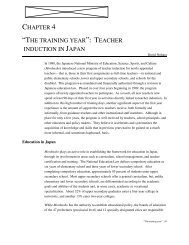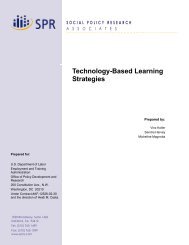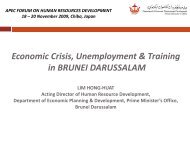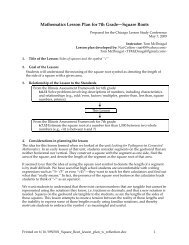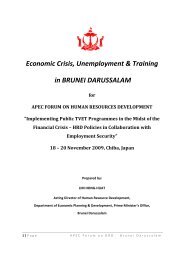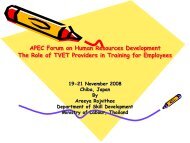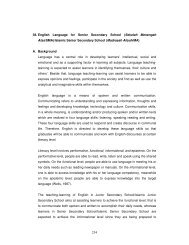Quality Assurance Systems in Asia-Pacific Economic Cooperation
Quality Assurance Systems in Asia-Pacific Economic Cooperation
Quality Assurance Systems in Asia-Pacific Economic Cooperation
You also want an ePaper? Increase the reach of your titles
YUMPU automatically turns print PDFs into web optimized ePapers that Google loves.
ENHANCEMENT OF QUALITY ASSURANCE SYSTEMS IN HIGHER EDUCATION IN APEC MEMBER ECONOMIES<br />
reviewers which may play an important role <strong>in</strong> the improvement of the <strong>in</strong>stitution or program. If<br />
the <strong>in</strong>stitution or program does not have respect for the reviewers, or considers them not to be<br />
reliable, for whatever reason, their op<strong>in</strong>ions will be dismissed, and an important part of their<br />
contribution will be lost.<br />
5.8 Role of Agency Staff <strong>in</strong> On-site Visit<br />
In general, QA staff have adm<strong>in</strong>istrative functions such as notify<strong>in</strong>g the <strong>in</strong>stitutions,<br />
develop<strong>in</strong>g the register of reviewers and publication of the f<strong>in</strong>al quality assurance outcome.<br />
These functions do not require a big staff complement or many staff of high academic<br />
stand<strong>in</strong>g. With a small core group of competent professional staff these responsibilities can<br />
be organised well and discharged effectively. In many cases, staff are also <strong>in</strong>volved <strong>in</strong> the<br />
development of the quality assurance framework, tak<strong>in</strong>g responsibility for monitor<strong>in</strong>g the<br />
major phases of quality assurance, tra<strong>in</strong><strong>in</strong>g the reviewers, and orient<strong>in</strong>g the <strong>in</strong>stitutions for<br />
<strong>in</strong>stitutional preparations.<br />
There are many systems where the QA staff jo<strong>in</strong>s the review team either as a full member or<br />
as the Coord<strong>in</strong>ator or Secretary to the review panel. Hav<strong>in</strong>g QA staff on the review panel<br />
affects the report<strong>in</strong>g strategy of the panel. Often one member of the review team is made<br />
responsible for the draft<strong>in</strong>g of the report <strong>in</strong> close cooperation with the other members of the<br />
team. When the staff of the quality assurance agency jo<strong>in</strong>s the review team, (s)he takes the<br />
responsibility for the team’s report, <strong>in</strong> consultation with the other members of the review team.<br />
Whether this option is adopted depends on the size of the national systems of higher<br />
education, the size of the quality assurance agency, the amount of quality assurance work to<br />
be done and, consequently, whether it is possible to send a staff member for each of the<br />
review teams. For example, <strong>in</strong> AUQA, the writ<strong>in</strong>g of the audit report is the responsibility of the<br />
AUQA staff person who is a full member of the audit team. This is possible s<strong>in</strong>ce the AUQA<br />
has to cover only 51 entities <strong>in</strong> a period of 5 years. The NZUAAU of New Zealand also follows<br />
the same pattern. In Canada, the College Education Evaluation Commission (CEEC) takes an<br />
active role <strong>in</strong> its assessment exercises. The teams are headed by one of the commissioners<br />
of the commission.<br />
When the QA staff does not jo<strong>in</strong> the team at all <strong>in</strong> any capacity, the review team chair or one<br />
of the members would take the responsibility to prepare the report. Even if the QA staff jo<strong>in</strong>s<br />
the team as a coord<strong>in</strong>ator, the policy of the QA system may be such that the staff does not<br />
take an active role <strong>in</strong> draft<strong>in</strong>g the report.<br />
This is the option followed <strong>in</strong> some of the regional accredit<strong>in</strong>g agencies of the USA. While the<br />
Higher Learn<strong>in</strong>g Commission of the North Central Association of Colleges and Schools does<br />
not send its staff to jo<strong>in</strong> the review team, the Accredit<strong>in</strong>g Council for Independent Colleges<br />
and Schools (ACICS) of the USA sends a staff member to jo<strong>in</strong> the team but s/he does not<br />
have a role <strong>in</strong> the assessment decisions. It describes the role of the agency staff as below:<br />
“Dur<strong>in</strong>g the visit, the primary role of the staff is to <strong>in</strong>terpret the ACICS Accreditation<br />
Criteria. Staff will provide team members with guidance <strong>in</strong> understand<strong>in</strong>g and<br />
apply<strong>in</strong>g the Criteria and may assist team members with gather<strong>in</strong>g <strong>in</strong>formation as<br />
time provides. Staff is not to be assigned sole responsibility for the writ<strong>in</strong>g of any<br />
section of the team report with the exception of the publications section. Staff also will<br />
ensure that all areas of the <strong>in</strong>stitution’s operation are properly reviewed by the team<br />
members.”<br />
This option also makes it very clear both to the HEIs and the external reviewers that the<br />
responsibility for evaluation rests with the external review team and not with the staff of the<br />
agency. In this approach, the QA staff members are experts on procedural aspects, but they<br />
do not fulfil the requirements to act as peers. Therefore, the QA staff may provide secretarial<br />
or clerical or procedural support to a team, but the responsibility for the contents of the report<br />
lies with the team.<br />
The emerg<strong>in</strong>g pattern is that of quality assurance becom<strong>in</strong>g a profession by itself, and to<br />
ma<strong>in</strong>ta<strong>in</strong> professionalism the QA staff are seen as peers <strong>in</strong> QA. The survey <strong>in</strong>dicates that<br />
20



